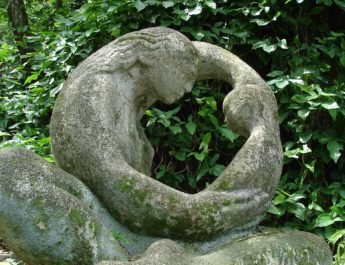Psalm 51:7-12
Narrative Lectionary 432
7 PurgeA me with hyssop, and I shall be clean;B
washC me, and I shall be whiterD than snow.E
A “purge” = chata. This is properly to miss, and so figuratively it is used for sinning, bearing the blame, expiate. It implies a forfeiture or loss of something.
B “clean” = taher. This is properly being bright, which implies being pure or clean. This word can also mean purge, cleanse, or purify. It can be clean in a ritual sense or a moral one (i.e. moral or holy).
C “wash” = kabas. This is to trample – washing by stomping feet. It can be fulling in a literal or figurative sense.
D “be whiter” = laban. 8x in OT. This is to be white or make a brick.
E “snow” = sheleg. 19x in OT. Perhaps from shalag (to snow, to be white). This is snow or snowy.
8 Let me hearF joyG and gladness;H
F “hear” = shama. This is to hear, call, consent, or consider. It implies listening intelligently, giving attention, and, because of these two factors, obedience and action are often implied.
G “joy” = sason. From sus (to rejoice, be glad; properly, to be bright or cheerful). This is rejoicing, cheerfulness, and welcome.
H “gladness” = simchah. From samach (to rejoice, be glad; properly, to brighten up; also used figuratively). This is joy, rejoicing, pleasure, or glee.
let the bonesI that you have crushedJ rejoice.K
I “bones” = etsem. From atsam (vast, numerous, strong; to close one’s eyes, to make powerful; to break bones). This is self, life, strength, bone, or substance.
J “crushed” = dakah. 5x in OT. This is to crush or break. It is collapse whether in the body or in the mind. It can also mean to crouch or be contrite (as in Psalm 51:17 “a broken and contrite heart, O God, you will not despise”).
K “rejoice” = gil. Properly, this is twirling around because of a strong feeling whether of rejoicing or from fear. This can be rejoice, be glad or joyful, or to cry.
9 HideL your faceM from my sins,N
and blot outO allP my iniquities.Q
L “hide” = sathar. This is hide, conceal, or be absent. It is hiding because something is covered – used in a literal or figurative sense.
M “face” = paneh. From panah (to turn, face, appear). This is face in a literal or figurative sense. It could be face, presence, anger, respect. It can also be used of God to indicate divine favor or presence.
N “sins” = chet. Related to “purge” in v7. From chata (see note A above). This is sin, fault, or punishment of sin.
O “blot out” = machah. This is to rub, which implies to erase. It can also be making something smooth with grease or oil. So, this could we wipe out, blot out, or destroy. Also, to touch or reach.
P “all” = kol. From kalal (to complete). This is all or every.
Q “iniquities” = avon. Perhaps related to avah (to bend, twist, be amiss). This is sin, mischief, guilt, fault, punishment for iniquity, or moral evil.
10 CreateR in me a cleanS heart,T O God,U
R “create” = bara. This is to create, shape, choose, or select. It is the word used in Genesis 1:1 when God created the heavens and the earth.
S “clean” = tahor. Related to “clean” in v7. From taher (see note B above). This is clean or pure in a literal, ritual, or ethical sense.
T “heart” = leb. May be related to labab (to encourage; properly, to be encased as with fat; used in a good sense, this means to transport someone with love; used in a bad sense, it can mean to dull one’s senses). This is the heart, courage, one’s inner self, the mind, or the will. Heart is only used in a figurative sense in the Old and New Testaments.
U “God” = Elohim.
and put a newV and rightW spiritX withinY me.
V “put a new” = chadash. 10x in OT. This is to renew or restore, to repair or rebuild.
W “right” = kun. Properly, this means in a perpendicular position. So, it is set up in a literal sense – establish, fix, fasten, prepare. In a figurative sense, it is certainty, to be firm, faithfulness, render sure or prosperous.
X “spirit” = ruach. This is breath, wind, air, cool, spirit. This is wind, which resembles the breath and so this can be used figuratively for life itself or being frail/mortal/impermanent. It can refer to the air of the sky or the spirit.
Y “within” = qereb. Perhaps from qarab (to come near or approach). This is among, in the midst, before, the center It is the inward part, whether literal or figurative. It can also be used for the heart, the site of thoughts and feelings. This word is also used as a technical term for the entrails of the animals who are sacrificed.
11 Do not cast me awayZ from your presence,AA
and do not takeBB your holyCC spirit from me.
Z “cast…away” = shalak. This is to throw, fling, or hurl. It can also be to throw away in a literal or figurative sense.
AA “presence” = paneh. Same as “face” in v9. See note M above.
BB “take” = laqach. This is to take, accept, carry away, receive. It can also have the sense of take a wife or take in marriage.
CC “holy” = qodesh. This is set apart and so sacred. God is different from us and so God is holy/set apart. Things we dedicate to God’s service are set apart for God and so they, too, are holy, etc.
12 RestoreDD to me the joy of your salvation,EE
and sustainFF in me a willingGG spirit.
DD “restore” = shub. To turn back, return, turn away – literally or figuratively. Doesn’t necessarily imply going back to where you started from. This is also the root verb for the Hebrew word for repentance “teshubah.”
EE “salvation” = yesha. From yasha (to deliver, defend, help, preserve, rescue, be safe. Properly, to be open, wide or free, which implies being safe. Used causatively, it means to free). This is salvation, deliverance, rescue, safety, welfare, liberty.
FF “sustain” = samak. This is to lean, rest, support, brace, uphold, sustain, or establish. It is to lean on in a positive or negative sense.
GG “willing” = nadib. From nadab (to offer willingly, volunteer, freely give, be willing). Properly, this is voluntary and so it implies generous, noble, magnanimous, or a generous person.
Image credit: “pure water” by Natalio, 2014.




